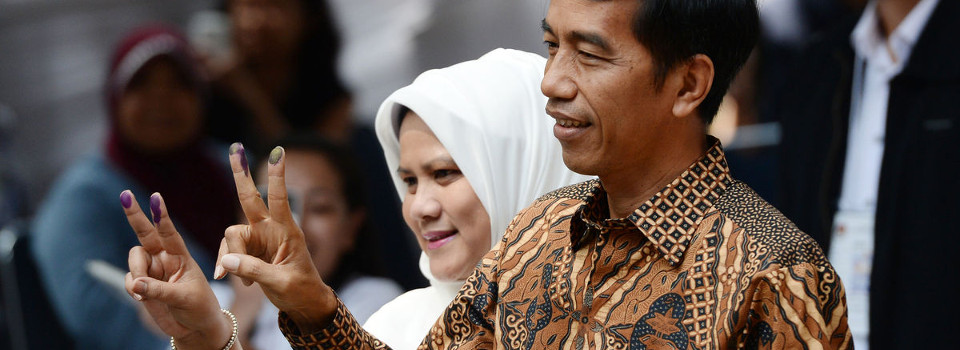INDONESIA’S NARROW ROAD OF DYNASTIC POLITICS

Political dynasties will likely be behind whoever becomes Indonesia’s next president, despite the two-phase electoral process set up to rein in oligarchy power.
OLIGARCHS in Indonesia today have such a stranglehold over the political process that the outcome of next year’s presidential race will largely be in their hands. Outsiders eyeing the top post will not get far, even if they are popular, without the approval of one of the nation’s powerful families.
The iron grip of the dynasties tightened with Dr Susilo Bambang Yudhoyono’s recent decision to take over the chairmanship of the Democratic Party at a congress in Bali. The move will help the leader, who will step down next year after a decade as President, keep the family name in the political ring for years to come.
The presidential election will pit his family, the Sukarnos and the Bakries against one another.
Dr Yudhoyono founded the Democratic Party in 2002, and won the presidency in 2004 and 2009. He cannot run again but now, as party chairman, holds the right to name its presidential candidate. Possible nominees are First Lady Ani Yudhoyono and her brother Edhie Pramono Wibowo, the army chief of staff who will reach the military’s mandatory retirement age of 58 in June.
Today, the President straddles the party’s top three posts: chairman, chief patron and head of the high council. His younger son, Edhie “Ibas” Bhaskoro, is secretary-general. The family’s control of the party has been growing not only by design but also by default, due to the dearth of talent. It will pave the way for Dr Yudhoyono to groom one of his two sons for the presidency some day, most likely Agus Harimurti, a 34-year-old major in the Indonesian Army who is perceived to be too young to run next year. Also, two family loyalists worth watching are economics czar Hatta Rajasa and Trade Minister Gita Wirjawan, while Agus waits in the wings.
The daughter of Indonesia’s first president, Sukarno, is ranked in surveys as one of the top two contenders. Ms Megawati Sukarnoputri, chairman of the Indonesian Democratic Party-Struggle (PDI-P), was president from 2001 to 2004.
Even though she lost the race twice after that to Dr Yudhoyono, her advisers have a hard time convincing her to let an outsider run on the party’s ticket. Two of her children – son Prananda Prabowo, and daughter Puan Maharani, an elected Member of Parliament – could inherit the family mantle eventually.
Golkar chairman Aburizal Bakrie heads the huge and diversified Bakrie business group. His family wields influence not only in business but also in politics. He has claimed Golkar’s ticket for the presidency and is using his media empire to advertise himself to voters.
All three families have one thing in common: control of the nation’s biggest political parties.
Family ties
MANY Indonesians do not flinch when prominent families assume a hereditary political role. The acceptance reflects traditions in which the king’s aura surrounds those close to him. Elections are thus seen merely as an opportunity for these families to renew their hold on power – and ensure their fortunes.
In politics, power and wealth feed off one another. While many wealthy families prefer to stay out of the political limelight and exercise power through their money, a few believe their status would be more secure and sustainable if they engaged in politics. They form the dynasties that dominate politics.
They jealously guard their access to power, denying it to those without lineage or wealth. At a higher level, they form a small circle of oligarchies and take turns to share power. But the system fails to represent society at large or develop the broad-based network of elites vital to a vibrant democracy.
To discourage such monopolies, Indonesia has a two-step election process – first for Members of Parliament and later, for the president. Voters may favour one party for MPs but another for the president. When the process was introduced in 2004, it worked. Golkar won the most votes but Dr Yudhoyono, leading the much smaller Democratic Party in its debut, won the presidency. But five years later, he and his party won both elections.
This two-phase process no longer ensures diversity. Political dynasties might have outwitted the system. While they cannot dictate the outcome, they control the electoral process that will keep outsiders at bay next year.
Alternative leaders
MANY non-partisan public figures enjoy popular support that could win them the presidency. But without the backing of a major political party or financial clout, they fail at the first hurdle – getting nominated.
One example is Jakarta Governor Joko “Jokowi” Widodo, reputed for his humility and trustworthiness. Many believe he can defeat the dynasties’ candidates. But since he won the gubernatorial race with PDI-P support, he is unlikely to challenge chairman Megawati for the party’s presidential ticket, although supporters within and outside PDI-P have urged him to run.
Another potential non-dynastic candidate is former Constitutional Court justice Mahfud MD. His strong Islamic credentials make him popular. But with his limited finances, he would be lucky to even get nominated.
Such figures are barred from the ruling circle by dynastic politics. But they are precisely the kind of “outsiders” who would respond to the aspirations of the young and middle-class voters who do not want their choices limited to big brand names.
Although not an independent like Mr Widodo and Mr Mahfud, retired army general Prabowo Subianto is another alternative to the dynastic candidates.
Mr Subianto is the son of the late Soemitro Djojohadikusumo, a respected economist who worked for presidents Sukarno and Suharto. He founded the Gerindra Party, which made its debut in 2009. He is expected to be the front-runner in the presidential race given his widespread grassroots support. But his party needs to do better next year to meet the criteria to be able to nominate a candidate for the race.
A hybrid compromise?
INDONESIA took a leap towards democracy in 1998 after more than three decades of Suharto’s rule. Through a series of constitutional amendments in 1999 to 2002, it pulled the military out of day-to-day politics, introduced a multi-party election system and direct presidential election, and imposed a presidential term limit. These were all designed to prevent another dictatorship.
But after three elections, those in the vanguard are forming dynasties and beating the system by either bestriding one of the big political parties or launching their own. With their collusion, the number of parties approved by the electoral commission to contest the national polls has been slashed from 44 in 2009 to just 12.
To level the playing field, Indonesia must limit the power of political parties to control the electoral system. The difference today from the Suharto era is that there are a few more players. The door must be opened wider still to let independent candidates run for president. They can be nominated only by a political party, according to the Constitution.
Loosening this grip through another round of constitutional amendments in time for the 2014 election is an unlikely prospect.
But there is a window of opportunity for popular political figures.
The dictates of realpolitik could see oligarchs wooing them to exploit their popularity and join forces in next year’s polls. Depending on how the terms of such nominations are negotiated, the power of the dynasties could paradoxically grow. The candidate, if elected, will have to balance the demands of protecting his backer’s interests and of serving the nation.
More than three decades of Suharto’s rule stunted the rise of political talent. Fifteen years later, that trajectory continues and Indonesia is still in an impenetrable fog, bereft of a deep and self- renewing pool of leadership.
This hybrid arrangement between dynasties and incipient leaders will make the serpentine path of dynastic politics even more convoluted. It may further warp Indonesia’s political development but it also offers a glimpse of hope.
With the passage of time, Indonesians, especially the growing middle class, might well signal that while dynastic politics still prevails, their desire is for a future where access to power is available to a broader constituency of people.

